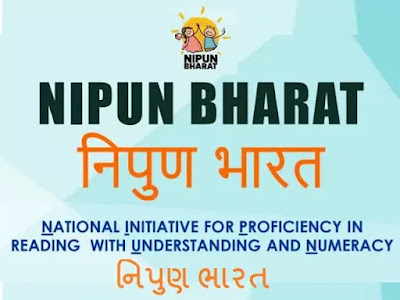NIPUN Bharat Gujarati in Gujarati, By SSA Gujarat
NATIONAL EDUCATION POLICY 2020 (NEP 2020):
NEP 2020 publishes that at present a large proportion of students at primary level - an estimated over 50 million students have not been able to achieve basic literacy and numeracy. NEP-2020 further emphasizes that it is imperative to address this crisis immediately and immediately, so that basic education can be achieved in schools and all students have access to quality education.
There should be an immediate national mission for all children to acquire basic literacy and numeracy. Students, as well as their schools, teachers, parents and the community, should be given immediate support and encouragement in every possible way to help them achieve all these important goals and missions, which are indeed the basis of all future education.
It is also important to note that familiar language has a key role to play in ensuring a better education for children. The multilingual approach generally supports the learning of all languages well, starting with the strong foundation of children's mother tongue which has been proven by universal research. Our effort should be to develop a consensus around the importance of multilingual education to support improved literacy and numeracy skills as well as better teaching of other languages and subjects.
To avoid a learning crisis, the policy suggests that the entire elementary and secondary school curriculum will focus on basic literacy and numeracy and, in general, reading, writing, narration, arithmetic, and arithmetic and mathematical thinking - continuous constructive (developmental) / adaptive assessment.
Tracking each student's learning individually with a robust system and thus ensuring each student's learning, the purpose of education is not only cognitive development but also character building and creation of holistic and holistic individuals equipped with key 21st century skills for which our school system Assessments that are concise and primarily examine rot memorization require regular and formative assessments instead.
The assessment should consistently reflect the learning gap of each child, consistent with the standard appropriate study findings, and should eliminate these gaps in a timely manner. The system will be aptitude-based, promote children's learning and development and test high-level skills such as analysis, critical thinking and conceptual clarity.
CRC BRC OLD PAPER AND ANSWER KEY
Recognizing the important role of basic skills in national development, it was announced under the 'Atmanirbhar Bharat Mission' that a national basic literacy and numeracy mission will be launched in the country by 2026-27 to ensure that every child up to standard 8 acquires basic literacy and numeracy. The curriculum structure for the purpose will be developed to systematically advance practical teaching materials - both online and offline, study findings, teacher capacity building, and their measurement indicators, assessment techniques, etc.
NIPUN Bharat Gujarati in Gujarati, By SSA Gujarat
નીપુણ ભારત ગુજરાતી ભાંષાનત્તર માટે અહિ ક્લિક કરવું
NEP 2020 Gujarati saransh Click Here
NEP 2020 alekhan Saransh Book pdf
Gujarat NEP 2020 Task force Committee 9/02/2021

No comments:
Post a Comment